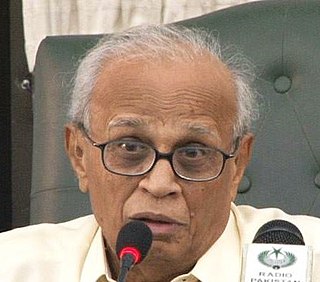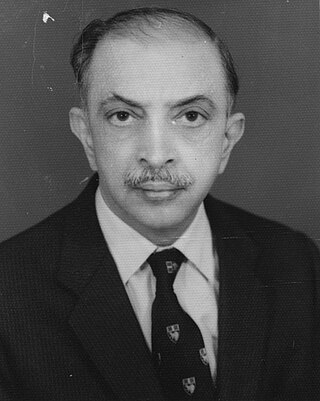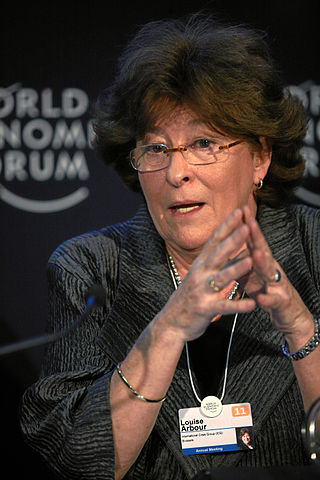Related Research Articles

Nazim Hussain Siddiqui a Pakistani jurist who served as Chief Justice of the Supreme Court of Pakistan, from 31 December 2003 to 29 June 2005.

Brigadier Siddique Salik, SI(M), was an officer in the Pakistan Army. He was a combat artist, humorist, novelist, and a memoirist who served as 8th Director-General of the Inter-Services Public Relations from 1985 until his death in 1988 in the plane crash in Bahawalpur with then President.

Sheikh Anwarul Haq, was a Pakistani jurist and an academic who served as the 9th Chief Justice of Pakistan from 23 September 1977 until resigning on 25 March 1981. He signed the death warrant for former Prime Minister Zulfikar Ali Bhutto in a controversial murder case. Bhutto was executed on April 4, 1979.

Ali Ahmed Fazeel was a Pakistani Attorney General.

Nasir Aslam Zahid ; Barrister-at-Law, is a Pakistani judge who served as the Chief Justice of the Sindh High Court and then a judge of the Federal Shariat Court of Pakistan and Supreme Court of Pakistan.

Fakhruddin G. Ebrahim, TI was a Pakistani judge, a legal expert and senior most lawyer. He was appointed as the 24th Chief Election Commissioner of Pakistan on 14 July 2012 and served until he resigned on 31 July 2013 and oversaw the 2013 election.

Dorab Framrose Patel was a Pakistani jurist of Parsi descent, and lawmaker who served as a former justice of the Supreme Court of Pakistan and former chief justice of the Sindh High Court. Patel was a prominent campaigner for human rights, and was a founding member of the Asian Human Rights Commission (AHRC) in 1987 and the co-founder of the Human Rights Commission of Pakistan.

The High Court of Sindh is the highest judicial institution of the Pakistani province of Sindh. Established in 1906, the Court situated in the provincial capital at Karachi. Apart from being the highest Court of Appeal for Sindh in civil and criminal matters, the Court was the District Court and the Court of Session in Karachi.
The 12 May Karachi riots, also known as Black Saturday riots, were a series of violent clashes between rival political activists in Karachi. The violence resulted in 58 killings of ethnic Pashtuns. The unrest began as the recently suspended chief justice Iftikhar Muhammad Chaudhry arrived at the Jinnah International Airport on 12 May 2007. Gunfights and clashes erupted across the provincial capital as lawyers, Pakistan Peoples Party (PPP), Awami National Party (ANP), Pakistan Tehreek-e-Insaf (PTI), and Pashtunkhwa Milli Awami Party (PMAP) activists, who supported the judge, and the pro-government Muttahida Qaumi Movement (MQM) activists took to the streets against each other. Pakistan Muslim League Quaid-e-azam PMLQ and MQM party workers, with support from president and military dictator Gen. Pervez Musharraf, were accused of launching highly coordinated attacks against lawyers, ANP, PTI, PPP, and news channels, especially Aaj News. Government machinery was used to block all major roads. Police was accomplice and a silent spectator to the violence. News media was attacked at Guru Mandir when MQM activists began firing at Aaj News headquarters which was shown on live television.

Haziqul Khairi was a Pakistani jurist and author who served as Chief Justice of the Federal Shariat Court of Pakistan, Judge of the Sindh High Court, Ombudsman of Sindh and Principal of Sindh Muslim Law College. He was the grandson of eminent British India social reformer, Allama Rashid ul Khairi.

Wajihuddin Ahmed is a retired senior justice of the Supreme Court of Pakistan, human rights activist, and former professor of law at the Sindh Muslim Law College.
Makhdoom Ali Khan, is a Pakistani lawyer who is a Senior Advocate Supreme Court. Khan has held numerous positions, including Attorney General of Pakistan, chairman of the Pakistan Bar Council, member of the Law and Justice Commission of Pakistan, board member of the Federal Judicial Academy of Pakistan and of the Sindh Judicial Academy.

Abdul Hameed Dogar is a Pakistani jurist who served as the former Justice of Sindh High Court, before being appointed Chief Justice of Pakistan by President Pervez Musharraf, after he dismissed the superior judiciary and declared emergency rule in 2007.

The Sindh Muslim Government Law College or S. M. Law College is one of the oldest law schools of Pakistan, situated in Karachi, Sindh. The college has produced numerous notables including Chief Justices of Pakistan, Chief Justices of Federal Shariat Court, Chief Ministers of Sindh, Federal Ministers, and many judges of the Supreme Court of Pakistan and Sindh High Court.

St. Anthony's High School is a Catholic school system for boys & girls located in Lahore, Punjab, Pakistan. In spite of its name as a high school, the school delivers a pre-school, primary, high school and college education across three campuses in Lahore. Established in 1892 by the Capuchin Friars from Belgium, the school is part of the Roman Catholic Archdiocese of Lahore. The school's main campus is situated at Lahore's historical road, The Mall, adjacent to the Sacred Heart Cathedral.

Jawwad Sajjad Khawaja, known professionally as Jawwad S. Khawaja, is a Pakistani jurist, and former professor of law at the Lahore University of Management Sciences, who served as the 23rd Chief Justice of Pakistan. He was nominated for the position by Prime Minister Nawaz Sharif on 17 August 2015, and approved to take office by President Mamnoon Hussain on the same day.

Women in law describes the role played by women in the legal profession and related occupations, which includes lawyers, paralegals, prosecutors, judges, legal scholars, law professors and law school deans.

Gulzar Ahmed is a Pakistani jurist who served as the 27th Chief Justice of Pakistan from 21 December 2019 to 1 February 2022.
Ayesha A. Malik is a Pakistani judge. She is the first female judge of the Supreme Court in the history of Pakistan. On 6 January 2022, the Judicial Commission of Pakistan approved her appointment to the Supreme Court of Pakistan. She took her oath of office on 24 January 2022. Malik has also served as a Judge of the Lahore High Court in Pakistan from 27 March 2012 to 5 January 2022.

Chaudhry Ijaz Ahmed was a justice of the Supreme Court of Pakistan and of the Lahore High Court.
References
- ↑ Reporter, The Newspaper's Staff (6 August 2009). "KARACHI: Lawyer`s struggle behind restoration of judiciary: CJ". DAWN.COM.
- 1 2 "Justice Sarmad Jalal Osmany". DAWN.COM. 2 July 2012.
- 1 2 3 4 5 6 7 8 9 "Sarmad Jalal Osmany profile".